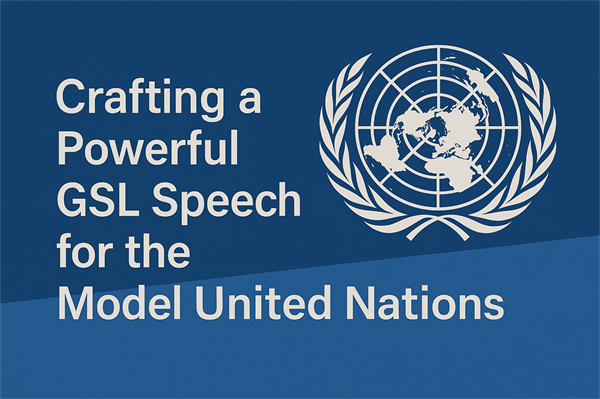Key Elements of Impactful MUNs
Model United Nations (MUN) conferences have become a hallmark of high school life. They allow students to step into the shoes of diplomats, debate pressing global issues, and learn the art of negotiation. But not every MUN is equally effective. Some conferences leave a lasting impression on participants, while others fail to create the same impact. The difference lies in the essential elements that make a high school MUN truly impactful.
In this blog, we will explore the key elements that ensure a memorable, educational, and inspiring MUN experience.
1. Clear Purpose and Vision
The foundation of any impactful MUN is a well-defined purpose. A high school conference should aim not only at replicating the structure of the United Nations but also at instilling skills like critical thinking, leadership, and diplomacy. Organizers should ask themselves: Is the goal to focus on debate quality, delegate development, or awareness about global challenges?
A conference without a vision often feels like just another school event. But when there’s a clear mission—such as empowering youth to solve real-world problems—participants leave with motivation and direction.
2. Engaging Committees and Agendas
The heart of any MUN lies in its committees and the agendas they discuss. High school MUNs should select topics that balance complexity with accessibility. Agendas that are too technical or vague can overwhelm delegates, while overly simplified ones may fail to spark meaningful debate.
For example, discussing “Climate Change and Global Cooperation” or “Cybersecurity in the 21st Century” strikes a perfect balance. These issues are relevant to students, globally significant, and allow for diverse perspectives. Creative committees like the Futuristic Security Council or Historical Crisis Committees can further engage participants by blending innovation with diplomacy.
3. Effective Training and Orientation
A common challenge in high school MUNs is that many students are first-time delegates. To ensure impactful participation, organizers must conduct orientation sessions or workshops. These sessions can cover basics like:
-
How to draft position papers.
-
Rules of procedure and parliamentary language.
-
Techniques for writing resolutions.
-
Public speaking and lobbying strategies.
When delegates enter a conference well-prepared, discussions become productive and enjoyable. Moreover, it boosts confidence among newcomers and prevents disengagement during sessions.
4. Skilled Executive Board (EB)
The Executive Board—comprising chairs, vice-chairs, and moderators—plays a decisive role in the success of an MUN. A skilled EB ensures that debate flows smoothly, rules are enforced fairly, and delegates are motivated to contribute.
High school MUNs should prioritize selecting EB members who are not only experienced but also approachable and encouraging. A supportive EB can transform nervous first-timers into confident speakers by guiding them, giving constructive feedback, and recognizing their efforts.
5. Balance of Competition and Collaboration
An impactful MUN is not just about winning awards. It’s about learning, collaborating, and understanding diverse viewpoints. While healthy competition is important, excessive focus on awards can discourage participants.
Organizers and EB members must promote a culture where teamwork and negotiation are valued as much as speaking skills. Recognizing qualities like diplomacy, creativity, and problem-solving in award criteria ensures that delegates focus on holistic growth, not just aggressive debating.
6. Professional Organization and Logistics
Logistics are the silent backbone of any successful MUN. From registration processes to committee placements, smooth organization reflects professionalism and respect for delegates’ time. Impactful MUNs pay attention to details such as:
-
Accurate background guides.
-
Well-prepared study materials.
-
Timely communication with participants.
-
Comfortable venues and resources like placards, notepads, and stationery.
Even small touches, like punctuality and a responsive organizing committee, enhance the delegate experience.
7. Inclusive and Diverse Participation
A truly impactful MUN creates a platform where everyone feels included. High school MUNs should encourage participation from students of different grades, schools, and backgrounds. Ensuring diversity in committees adds richness to debate, as delegates bring unique perspectives shaped by their experiences.
Inclusivity also means creating space for students with varying levels of experience. Novices should not feel overshadowed by veterans. Instead, mentorship and equal opportunities should be encouraged.
8. Memorable Social and Cultural Elements
Beyond the formal sessions, impactful MUNs create a sense of community. Social events, cultural performances, or informal networking opportunities help delegates form friendships and memories. These experiences make MUNs more than just academic simulations—they become unforgettable journeys of connection and growth.
9. Recognition and Reflection
At the end of the conference, recognizing participants’ efforts is essential. Awards should be fair and transparent, celebrating not just the loudest voices but also the most diplomatic minds. Additionally, offering certificates, constructive feedback, or post-conference reflections allows delegates to evaluate their growth.
Encouraging students to reflect on what they learned—be it about global politics, teamwork, or self-confidence—ensures the impact of the MUN lasts long after the closing ceremony.
10. Lasting Legacy
The most impactful high school MUNs don’t end with the gavel. They inspire students to continue learning, stay informed about global issues, and return for future conferences. Some even spark interest in careers in international relations, law, or public policy.
Organizers can build legacy by maintaining alumni networks, sharing post-conference reports, and encouraging students to implement solutions in real life. For example, a debate on climate change could inspire a school-level sustainability project.


Comments
Post a Comment